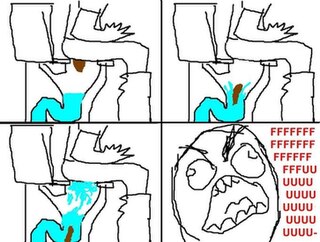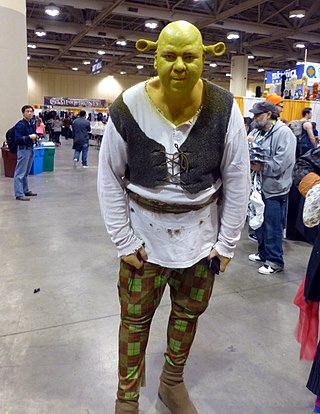
Pixel art is a form of digital art drawn with graphical software where images are built using pixels as the only building block. It is widely associated with the low-resolution graphics from 8-bit and 16-bit era computers, arcade machines and video game consoles, in addition to other limited systems such as LED displays and graphing calculators, which have a limited number of pixels and colors available. The art form is still employed to this day by pixel artists and game studios, even though the technological limitations have since been surpassed.

Cory Arcangel is an American post-conceptual artist who makes work in many different media, including drawing, music, video, performance art, and video game modifications, for which he is best known.
An anonymous post, is an entry on a textboard, anonymous bulletin board system, or other discussion forums like Internet forum, without a screen name or more commonly by using a non-identifiable pseudonym. Some online forums such as Slashdot do not allow such posts, requiring users to be registered either under their real name or utilizing a pseudonym. Others like JuicyCampus, AutoAdmit, 2channel, and other Futaba-based imageboards thrive on anonymity. Users of 4chan, in particular, interact in an anonymous and ephemeral environment that facilitates rapid generation of new trends.

4chan is an anonymous English-language imageboard website. Launched by Christopher "moot" Poole in October 2003, the site hosts boards dedicated to a wide variety of topics, from video games and television to literature, cooking, weapons, music, history, anime, fitness, politics, and sports, among others. Registration is not available and users typically post anonymously. As of 2022, 4chan receives more than 22 million unique monthly visitors, of which approximately half are from the United States.

Olia Lialina is an Internet artist and theorist, an experimental film and video critic and curator.
Marisa Olson is an artist, writer, curator, and former punk singer. In 2004 she auditioned for popular American television show American Idol as an artistic project. Over the course of three months of daily "training exercises," it is revealed that she is critiquing gender norms entrenched by the show, while also using the popularity of her site to speak to readers about using their voice to vote in elections as well as on the show.
Rhizome is an American not-for-profit arts organization that supports and provides a platform for new media art.

Futaba Channel, or Futaba for short, also sometimes called 2chan, is a Japanese imageboard. Users of the website can upload pictures and discuss a wide variety of topics, from daily personal problems to sports, ramen, otaku and underground culture.

Internet art is a form of new media art distributed via the Internet. This form of art circumvents the traditional dominance of the physical gallery and museum system. In many cases, the viewer is drawn into some kind of interaction with the work of art. Artists working in this manner are sometimes referred to as net artists.

Petra Cortright is an American artist working in video, painting, and digital media.

Glitch art is an art movement centering around the practice of using digital or analog errors, more so glitches, for aesthetic purposes by either corrupting digital data or physically manipulating electronic devices. It has been also regarded as an increasing trend in new media art, with it retroactively being described as developing over the course of the 20th century onward.

A rage comic is a short cartoon strip using a growing set of pre-made cartoon faces, or rage faces, which usually express rage or some other simple emotion or activity. They are usually crudely drawn in Microsoft Paint or other simple drawing programs, and were most popular in the early 2010s. These webcomics have spread much in the same way that Internet memes do, and several memes have originated in this medium. They have been characterized by Ars Technica as an "accepted and standardized form of online communication." The popularity of rage comics has been attributed to their use as vehicles for humorizing shared experiences. The range of expression and standardized, easily identifiable faces has allowed uses such as teaching English as a foreign language.
Rafaël Rozendaal is a Dutch-Brazilian visual artist currently living and working in New York City. He is known as a pioneer of Internet Art.

Post-Internet is a 21st-century art movement involving works that are derived from the Internet or its effects on aesthetics, culture and society.
Lorna Mills is a Canadian net.art and new media artist who is known for her digital animations, videos, and GIFs. Mills has done work in other mediums such as installations. Her work explores how "the notion of public decency is anachronistic" Her use of GIFs are gathered through the dark net which includes 4chan, pornfails, and Russian domains. She currently lives and works in Toronto, Canada.

Lindsay Howard is an American curator, writer, and new media scholar based in New York City whose work explores how the internet is shaping art and culture.
/pol/, short for Politically Incorrect, is an anonymous political discussion imageboard on 4chan. As of 2022, it is the most active board on the site. It has had a substantial impact on Internet culture. It has acted as a platform for far-right extremism; the board is notable for its widespread racist, white supremacist, antisemitic, Islamophobic, misogynist, and anti-LGBT content. /pol/ has been linked to various acts of real-world extremist violence. It has been described as one of the "[centers] of 4chan mobilization", a title also ascribed to /b/.

Pepe the Frog is a comic character and Internet meme created by cartoonist Matt Furie. Designed as a green anthropomorphic frog with a humanoid body, Pepe originated in Furie's 2005 comic Boy's Club. The character became an Internet meme when his popularity steadily grew across websites such as Myspace, Gaia Online, and 4chan in 2008. By 2015, he had become one of the most popular memes used on 4chan and Tumblr. Different types of Pepe memes include "Sad Frog", "Smug Frog", "Angry Pepe", "Feels Frog", and "You will never..." Frog. Since 2014, "rare Pepes" have been posted on the "meme market" as if they were trading cards.

DreamWorks Animation's Shrek franchise, based on William Steig's book of the same name, has an underground Internet fandom that started around 2009.

Paul Soulellis is an American graphic designer, artist, and educator. His writings and work in the field of experimental publishing and network culture are cited in influential scholarly research. His publications are collected and exhibited worldwide and on the internet. He works in New York City and Providence, Rhode Island.












